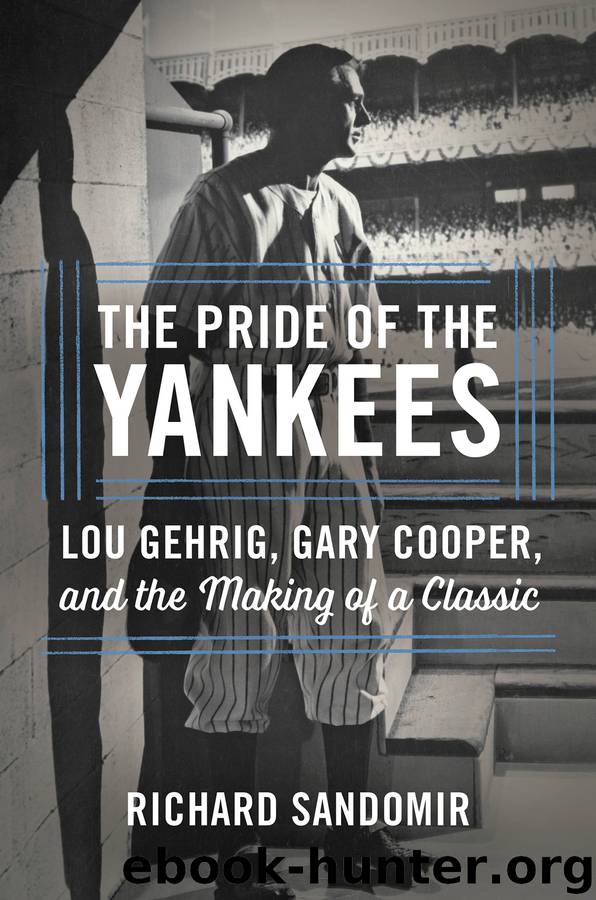The Pride of the Yankees by Richard Sandomir

Author:Richard Sandomir
Language: eng
Format: epub
Tags: Performing Arts / Film & Video / History & Criticism, Sports & Recreation / Baseball / History
Publisher: Hachette Books
Published: 2017-06-13T04:00:00+00:00
Croft’s window-shattering home run brings us to the Gehrigs’ shabby walk-down apartment, where we meet Elsa Janssen as Lou’s careworn mother, Christina, and his father, Heinrich, a well-dressed unemployed janitor, played by Ludwig Stossel. Janssen is stout, her gray hair in a bun, and fixated on her son becoming an engineer, like his uncle Otto. Any deviation by Lou from his future as an engineer, any signs that he loved baseball more, was cause for a reminder, if not a reproach, from Mom Gehrig that he had to return to Otto’s career path.
Otto exists only in a framed photograph hanging on a wall in the apartment, his face as stern as Janssen’s maternal demeanor is unyielding.
Late in the film, after Lou is an established superstar and Mom has enthusiastically accepted that her son will not be an engineer, Janssen scoffs, “Otto, schmotto!,” and reveals that he only dug ditches. Indeed, Eleanor stressed in a letter to Walsh that Otto was a fictional relative. “Lou’s real uncle has been dead many years,” she wrote. “He was a chef and he has a daughter and wife still living who are out and out chiselers. They have been dogging me for money for months.” She didn’t mind the make-believe Otto’s occupation in the script.
“It certainly is not libelous,” she added, “to make a chef into an engineer.”
Janssen’s Mom Gehrig is the dominant figure in the family, a woman who lost three children (which the film says nothing about), but her strong, respectful Lou survived. She smothered him with her overwhelming attention—for good reason. Niven Busch witnessed that when he profiled Gehrig as an adult, passive in his mother’s presence; the screenwriters imagined the excessive doting as the avenue to portraying the movie’s main tension between Mom and Eleanor. Mom wants to control every aspect of his life, from his career to his diet to whom he dates—she tries to midwife a romance between Lou and Hedwig, a butcher’s daughter, in an early script—to how Lou and Eleanor will furnish their home.
Gallico initially describes Mom as an “enormous hausfrau with arms like a wrestler, big bosom and rear end,” with her “thick hair done up in a knot.” Teamed with a veteran screenwriter, Earl Baldwin, Gallico turned Mom into an offensive immigrant caricature speaking in broken English (“Gott im himmel, it fires! Vawter!”). By late 1941, when Gallico and Abem Finkel (who, a year earlier, wrote Sergeant York) devised a detailed outline of the story, Mom’s screen personality was gradually softening and would be softened further into a tough but conciliatory character who gradually learns to get along with Eleanor, something she never did in real life. “Mom will not be written as a whining scold or a bullying nag but as an honest hardworking woman who is trying to keep her family together and bring up her boy,” Gallico wrote.
Croft, meanwhile, grows up quickly in Pride, sprouting from the kid whom Mom smacks on his butt for breaking the store window to Cooper,
Download
This site does not store any files on its server. We only index and link to content provided by other sites. Please contact the content providers to delete copyright contents if any and email us, we'll remove relevant links or contents immediately.
Machine Learning at Scale with H2O by Gregory Keys | David Whiting(4312)
Never by Ken Follett(3954)
Liar's Poker by Michael Lewis(3447)
The Ultimate Backcountry Survival Manual by Aram Von Benedikt; Editors of Outdoor Life;(3266)
Will by Will Smith(2919)
The Partner by John Grisham(2396)
Can't Hurt Me: Master Your Mind and Defy the Odds - Clean Edition by David Goggins(2339)
Friends, Lovers, and the Big Terrible Thing by Matthew Perry(2230)
Taste by Kris Bryant(1862)
A Short History of War by Jeremy Black(1848)
HBR's 10 Must Reads 2022 by Harvard Business Review(1842)
A Game of Thrones (The Illustrated Edition) by George R. R. Martin(1744)
Never Finished: Unshackle Your Mind and Win the War Within by David Goggins(1712)
515945210 by Unknown(1665)
Why We Love Baseball by Joe Posnanski(1658)
The Arm by Jeff Passan(1613)
443319537 by Unknown(1556)
The Dodgers by Schiavone Michael;(1532)
The Yogi Book by Yogi Berra(1525)
